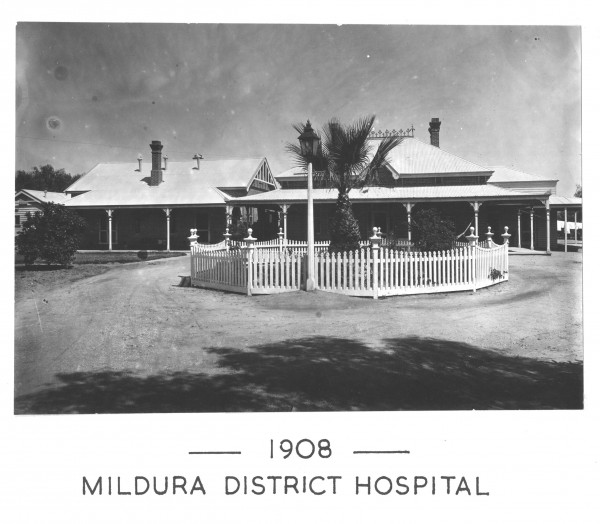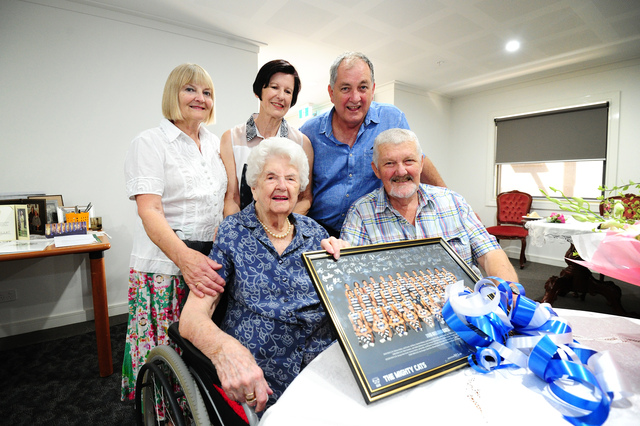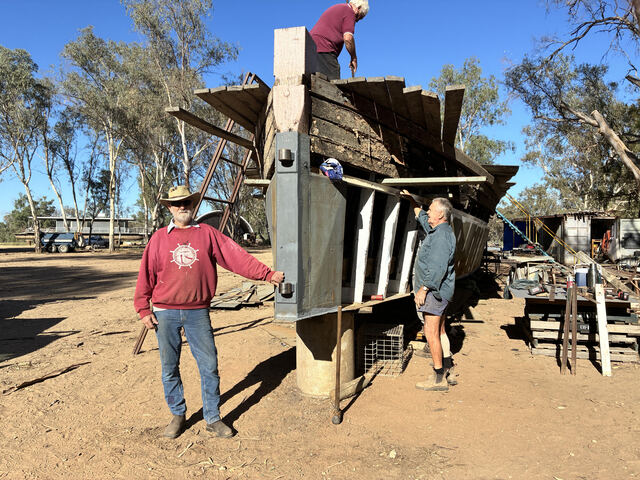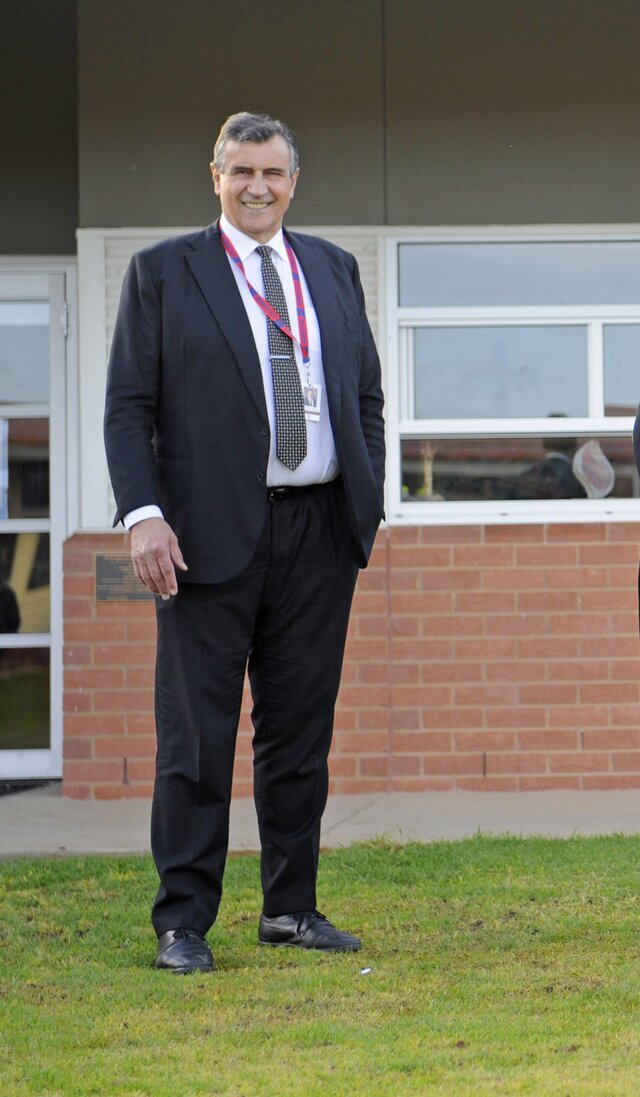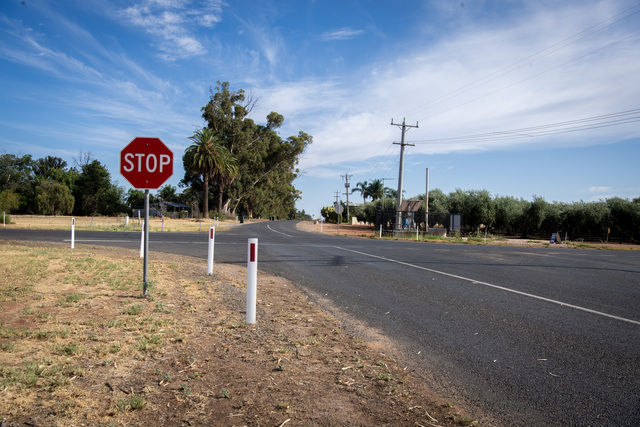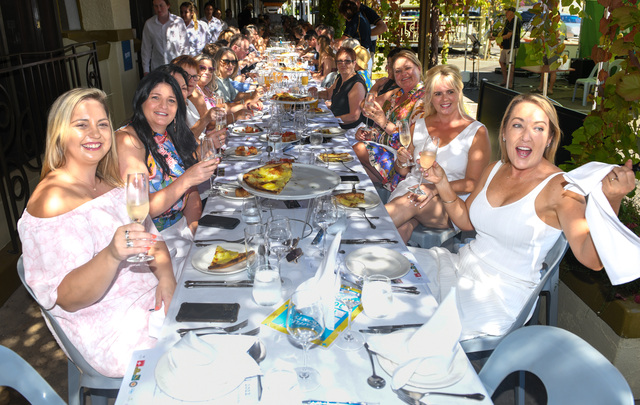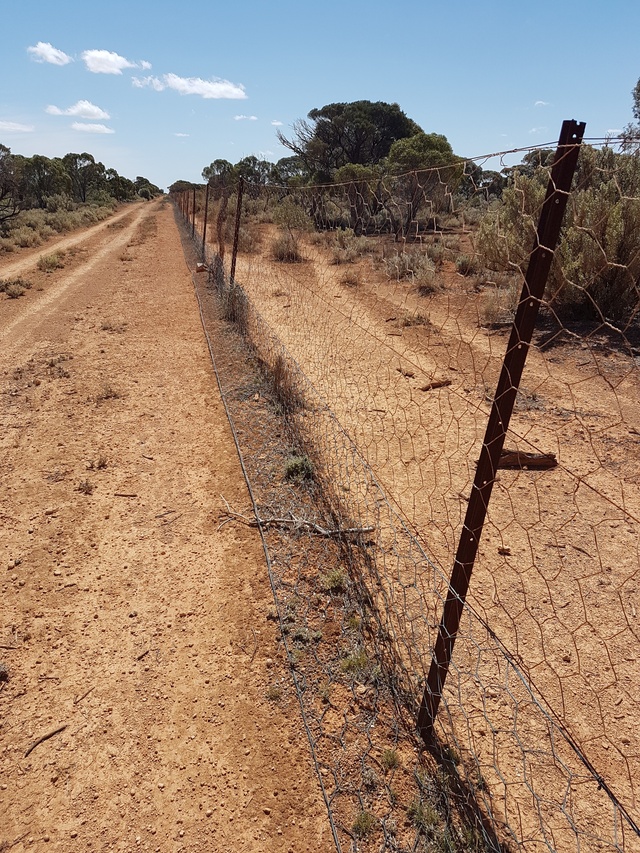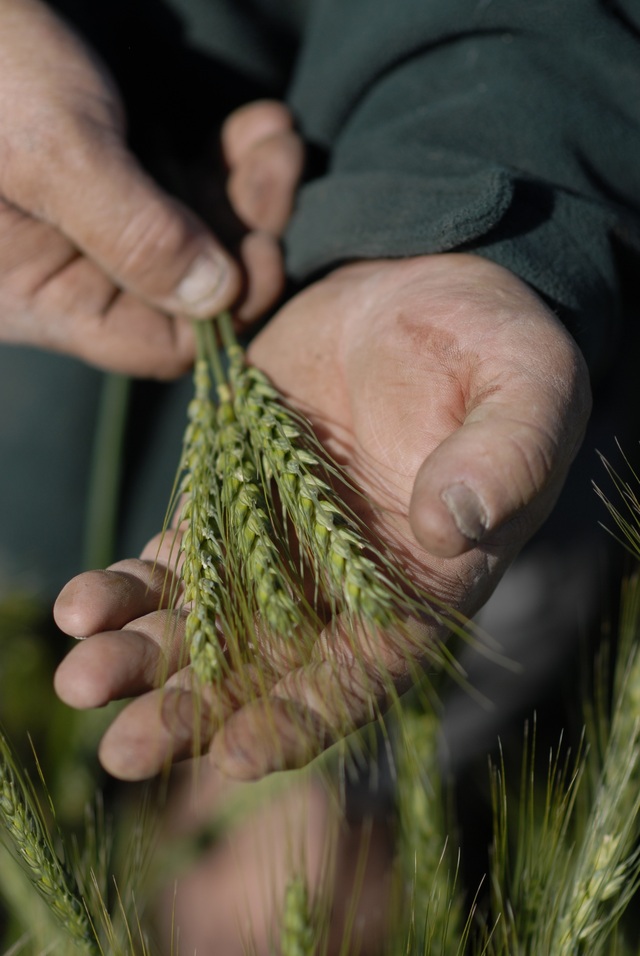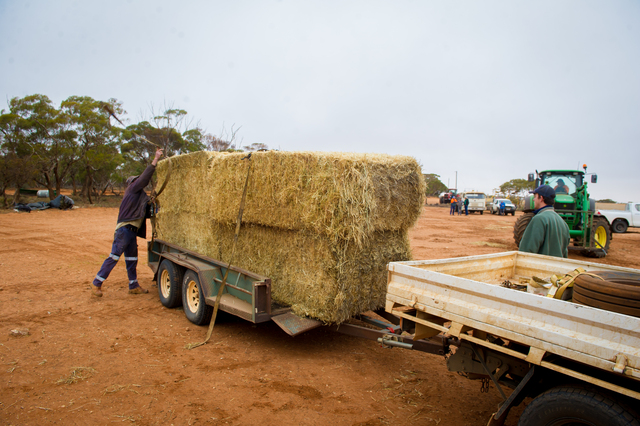19 – 25 December 2021
Presented by Mildura and District Historical Society.
Compiled by Ann Ziguras for the Mildura Rural City Council Library Service.
100 years ago
CHRISTMAS ARRANGEMENTS: Christmas and New Year’s Day fall on Sundays this year and will generally be observed as holidays on the following day so that the issue of Sunraysia Daily will have the longest break, no paper will be published on Monday December 26. Following last year’s practice, a Christmas tree will be the means of disposing gifts and toys to the little ones at the Mildura hospital. While Australians will be enjoying the festivities of Christmas thousands of children and adults in famine in Europe will be suffering. Sunraysia Daily has received from the Railway Commissioners a definite refusal to run a Christmas Eve tram. Christmas holidays will affect Mildura businesses as follows: Mildura Borough and Shire will be closed from midday Saturday. Members of the staff of the grocery department of Messrs R.M. Black & Co. have clubbed together to make a really good gift for the patients at the Mildura hospital.
EUROPE NEWS: There was a panic and a helter-skelter rush for safety, succeeded by pitiful scenes at Hull last night. Christmas shopping was in full swing when a tidal wave flooded portions of the town causing immense damage. A French newspaper’s comment concerning Germany’s default in its next reparations payments is frankly hostile In Rome two dead bodies were found in evening dress, and wearing their jewels in apparent readiness to go to a theatre or dance. Wild shooting has taken place in three areas in Belfast. Conflicts have been reported in twenty streets: Six persons have been wounded. The London Star‘s correspondent at Belfast says the area of terror this morning covered fifty streets. Consternation was caused at Washington by the French demand wanting £10,000,000 warships. France has stated its case to the naval committee, and it is understood that it has disclosed its intent to build ten 35,000 ton ships. France’s demand is that she be permitted to possess a navy equal to that of Japan. The Marconi company this morning demonstrated the possibility of bridging by wireless the gap in the trunk telephone service between countries.
LOCAL NEWS: The quick-cut Auto Ledger is an Australian invention for cutting trees, which would prove of great value in this district. Mildura’s new church was opened yesterday by the Bishop of Ballarat. This is one more outward and visible sign of the prosperity of the settlement, and a new church is a striking addition of the public buildings that give character to the settlement. The Mildura branch of the Wives of Mothers Friendly Union intend to have a Christmas Tree in the Deakin Avenue garden. Tonight the Gem will arrive at Mildura from Morgan, South Australia. She will depart on the return trip at noon tomorrow with passengers and cargo. On Friday evening the Mildura hospital was visited by the choir of St. Margaret’s church which, under the direction of Mr Hodges, entertained the ward. Tonight at Sherry’s Pictures, Merbein, in the open-air, Human Stuff is to be screened featuring Harry Carey, a foremost Western Star. “Quo Vadis”, the most wonderful picture ever, is being screened at Mildura Wonderland tonight. At one o’clock yesterday afternoon, a grass-fire was noticed in the Merbein wheat lands. Volunteer fighters were immediately called. Crops and grass were destroyed. An outbreak of fire on the ridge of Birdwoodton totally destroyed the home of Mr & Mrs C. Bennett.
SPORT: New South Wales is making a good show in Adelaide during the Interstate Cricket. The game between Lake and Birdwoodton and Merbein clubs was concluded early on Saturday afternoon when Merbein won. Particulars are announced of the sixty-fifth annual gathering of the Maryborough Highland Society, which will be held New Year’s Day. The first annual sports-meeting in connection with the Donald Higher Elementary School took place last Wednesday and was a great success. This afternoon, the YMCA amateur cycle race from Bendigo to Shelbourne took place, a distance of twenty-three miles was decided. Fitzroy scored 312 for five wickets and Kiernan knocked up 123. Mercentile just squeezed home from Wendouree in the Melbourne Rowing. Sydney Sculling Championships were won by Ripley by three lengths from McDevitt yesterday.
WHEAT: During last week 124,257 bags of new wheat passed through Bendigo on its way to the seaboard, making a total of 152,307 since the beginning of the harvest. On Thursday and Friday special trains took 6,000 bags of wheat each way from the railway stations on the Ouyen to Murrayville line. 1305 bags of wheat have been delivered at the Merbein railway station through the Victorian Producers Co-operative Company. A large fleet of British and foreign overseas vessels have been chartered to carry the new season’s wheat to Europe.
75 years ago
PRISONERS OF WAR: Warrant Officer William Stictenwich, from Newcastle (NSW) who was captured at Singapore and escaped in 1945, described to the War Crimes Tribunal today “cage treatment” which he and others underwent in a North Borneo prisoner-of-war camp. The victim was placed in a cage and made to stand rigid. If he relaxed he was taken out and beaten up by four guards. Beatings were frequent at the camp and lasted on an average 20 minutes. Stictenwich said that if a prisoner showed signs of pain he was beaten still harder. Some were forced to exist as long as seven days without food. The Japanese, when the camp was evacuated, killed 164 prisoners who were unable to walk. The camp was at Sandaken, to which 2900 British and Australian prisoners had been transferred from Malaya in 1942. Only 536 of the original 2900 were able to walk by the time of the retreat which occurred when the Allies were re-conquering the islands. The Japanese burned the camp as they fled. None of the sick prisoners left in hospital were ever seen again. Moving at night, Japanese soldiers herded the prisoners in groups originally composed of 50 along a jungle trail towards Ranau, 160 miles away.
LAPLAND: Most of us think of the reindeer only at Christmas time, when he looks out from Christmas cards and children’s books as Santa Claus’ beast of burden, thoroughly enjoying his Christmas Eve journeys. But to the people of Lapland he is an almost daily helpmate and source of wealth. Around him they create no aura of romance or glamor. They see him only as so much hide, horn and meat to be bred for marketing. Over the wild wastes of Northern Sweden, the reindeer range in huge hordes and in them each Lapp family has property. Most recent estimates place the reindeer population of these sub-Arctic wastes as being about 350,000. After the onset of winter, the Lapps leave their winter quarters near the coast and move all their possessions to the mountains, where they live during the summer. On the long, rough journey, it is the reindeer who acts as their pack-horse and long strings of the animals push onward loaded with all the camping equipment of their owners. Once back in the mountains, the Lapps prepare for the great day of the round-up, the Reknskilningsdag. On this day all the people gather to see the co-operative work and fun of herding in the reindeer. The animals are driven in the great corals, and there they are counted and marked. Each Lapp family has its own distinguishing mark which is nicked into the young reindeer’s ear. The prosperity of a Lapp is measured by the number of reindeer he can count his own. His happiness at the Reknskilningsdag depends on how many new calves he finds have been added to his herd. It is generally a happy day all round. There is the grand hunt for reindeer. Into long sessions of coffee drinking they retell old stories and develop new during the long dark winter. In addition to being extremely docile and easily broken in for farm purposes, reindeer have wonderful stamina and can cover the ground faster than a horse. Eskimos living near the delta of the Mackenzie River on the shores of the Arctic Ocean in Northern Canada were threatened by starvation by the thinning out of the caribou and walrus on which they relied for food. For their relief, the Canadian Government decided to import reindeer. There were none nearer than Alaska, 1,200 miles away. The great enterprise of driving 3,000 of these Alaskan animals across the snowy wastes to the Mackenzie was undertaken and carried through by 60 year old Andrew Hahr, a Laplander by birth and the North Countries’ most famous reindeer herder. Aeroplanes surveyed the route and the great trek was accomplished in five and half years.
CURIOUS HOBBIES: Mr E. Venter, of Bloemfontein (South Africa), has a collection of literature, mostly propaganda pamphlets, which prove that the earth is flat. This interesting school of thought (Kipling called them the “geoplanarians”) has always had a keen following in the flat parts of South Africa. Mr G. W. Morris, of Simons Town (South Africa), specializes in collecting autographed portraits of V.C.s. As the result of more than 3,000 letters, written by him in the course of 30 years he possesses the day to-day autographed portraits of 450 Officers and men who have won the Victoria Cross. Since this war he has added 20 more V.C.’s to his gallant gallery. Mr H.G.Wells was among the great collectors of tin soldiers. Napoleon I, in his captivity at St Helena, had a large collection of tin soldiers which he used for demonstrating the mistakes which his generals committed and had led to his losing his throne. The former British Prime Minister, Earl Stanley Baldwin, was a collector of stuffed owls. Julius Caesar collected mosaic tables and his favorite specimens accompanied him on all his campaigns. An Englishman, Mr Hanks, has made the collecting of spiderwebs his hobby. He preserves them between two glass plates. One of the Rothschilds, Baron N.C Rothschild, for scientific purposes, made a classified collection of over 10,000 different kinds of fleas acquired from all over the world. His cousin, Lord Walter Rothschild, specialized in albino animals and birds. At an exhibition of “curious and fascinating hobbies” held in a London store some years ago there was a collection of 50,000 wishbones.
WRITERS: In its earlier days Australia produced a celebrated “rough-rider poet” – only he happened to have been educated at Cheltenham and Oxford. Born in 1833, Adam Lindsay Gordon did not go South until he was twenty. In his adventurous life he became a mounted trooper, the most famous amateur steeplechase rider in Australia, and he also took part in politics. Verse was his real bent – the fancies of “Sea Spray and “Smoke Drift” – and he wrote much of it in the Mount Gambier district of South Australia. Perched up in a crooked tree-limb at “Dingley Dell,” he smoked his old clay pipe and let the rhymes gallop through his head: “Twas merry mid the blackwoods, when we spied the station roofs. To wheel the wild scrub cattle at the yard. With a running fire of stock whips, and a fiery run of hoofs; Oh! The hardest day was never then too hard: The first poet of importance, native to Australia, was Henry Kendall, born in Ulladulla, New South Wales in 1842. His boyhood was spent in the bush; his youth in a whaling ship in the South Seas. Unappreciated for some time in his own country, Kendall sent a bundle of manuscripts to the London “Athenaeum” and to the amazement of local critics three of the poems were published in that August journal. Now he was acknowledged and could bring out his volumes “Leaves From an Australian Forest” and “Songs from the Mountains.” He died at the age of forty, after a life of considerable hardship, and left poetry of rare grace. The school of novelists was headed by a woman of genius, “Henry Handel Richardson”. In her youth she studied music in Leipzig, but her real work is literary, Her Trilogy, “The Fortunes of Richard Mahoney,” contains some striking pen-pictures, as in this passage from “The Way Home”. “The good ship “Florabella” eight-four days out from Liverpool, made the Australian coast early one spring morning; and, therewith, the faint new, spicy smell of land wafted across the water. “Coming up from below to catch a whiff of it, its passengers blinked dazzled eyes at the gaudy brilliance of light and colouring. Here were no frail tints and misty trimmings; everything stood out hard, clear, emphatic. The water was a crude sapphire; the surf that frothed on the reef white as milk. As for the sky, Mahony declared it made him think of a Reckitt’s blue bag.”
50 years ago
JAMBOREE: Four senior scouts from Robinvale will represent Sunraysia area Scouts at the 8th National Jamboree in Pukekohe, New Zealand, next month. Donald Barker, Lyle Forbes, Owen Forbes and Alan Ginn will join 469 Scouts from all over Australia at the Jamboree, 30 miles south of Auckland. The Scouts will leave Melbourne and Sydney for New Zealand on December 30. The Jamboree senior Scouts who have gained Scout cords will compete for the Rutherford Challenge award, incorporating scoutcraft, public service, cultural activities, physic fitness, social and citizenship interest as well as a two day camp out. After the Jamboree, the Scouts will be shown through Rotarua, Hamilton, New Plymouth, Wellington and the North Island.
HUNGER: Two out of every three children in the world will go to bed hungry on Christmas Eve… if they have a bed, that is. They will not wake wide-eyed for Santa and his bounty. For them – all 600 million of them – Christmas Day will stretch ahead on yet another 24 hours of struggling to survive. This was the depressing picture described by Mr Tony Brett Young, spokesperson for England’s Save the Children Fund – the Fund “with a heart for children everywhere”. For the SCF and other organisations aiding the distressed, the festive season is almost obscured in the 365 day fight to live.
TEDDY BEARS: Just 70 years ago a U.S. president saved the life of a bear cub and started a cult which has kept his name alive long after his policies and achievements have been forgotten. Today a teddy bear is the king of a nursery. He has climbed mountains broken speed records and been on royal tours – one of America’s most famous sons.
PLATYPUS: Zoological history is likely to be made at Sydney’s Taronga Park Zoo this week. The Zoo Superintendent, Mr Cannon, says he expects a platypus to hatch out two eggs in the next three days. Only one platypus has been bred in captivity before, at Victoria’s Healesville Sanctuary in 1943. Mr Cannon says the platypus house has been closed to avoid disturbance to the mother, although he admits that care of a pregnant platypus is largely a trial and error operation.
MILDURA ARTS CENTRE: Over the past three days a total of 1322 people have visited the galleries and Rio Vista Museum. For the same period last year the figure was 861. Mrs M. Roberts, desk attendant, said the increase was despite a 10c rise in the admission fee. She said most of the visitors were adults and about 100 came in two buses yesterday. Business was quiet before the start of the public holiday with only 23 visitors on Christmas Eve.
GATHERINGS: It was an afternoon of drinks, jokes and many memories for Sunraysia’s oldest Diggers yesterday when a Christmas party was held in their honour at the Mildura RSL Club. A group of 20 Diggers who served in the First World War attended the party. Assistant Mgr of the Club (Mr N. Lucas) said the ages of the men ranged from 70 to 90 years of age, the oldest being 92. The first of 400 caravans from five states will begin to arrive in Mildura today for Australia’s first national caravan rally.
25 years ago
CAROLS BY CANDLELIGHT: Barclay Square will be overflowing with people tomorrow evening when the Red Cliffs Ministers Fellowship Carols By Candlelight is held. Beginning at 8.30pm, this year’s Carols by Candlelight will follow a nativity format, with the sequence of events occurring simultaneously with the carols on stage. The Henderson College choir is providing backing vocals. On Track will also perform an item. Admission and carols programs are free and Girl Guides will be responsible for the selling of candles. As a lead-up to the carols evening, the Red Cliffs Traders Association has decided to hold free barbecues in Indi Avenue and Ilex Street from 3pm. A number of shops will be open until 8pm tomorrow and until 4pm on Saturday and Sunday. Buskers are invited to entertain in Indi Avenue and Ilex Street with a competition to be judged and prizes presented at 6.30pm. A Christmas hamper will be drawn on the steps of the Red Cliffs Post Office at 7pm. The winners must be present to claim prizes.
MERBEIN CHRISTMAS ENTERTAINMENT: Some citizens of Merbein have a proud record of providing a December dinner and entertainment for the elderly members of the community for an unbroken 21 years. The Merbein Lions and Lions Ladies are responsible for the dinner and the Country and Western team of Irene Chandler, Johnny Reid and Brian Chapman have played at every one. The annual event began in a small way, for the lonely people of the town, but it has snowballed over the years and this year 148 invitations were issued. The evening included drinks from 6pm then a two-course meal with salads and desserts made by the Lions Ladies, followed by coffee with rum balls and dinner mints. Merbein Football Club contributed the venue free of charge and the football club ladies donated nuts, fruit, lollies and Christmas bonbons for the tables. Entertainment over the years has been provided by Col Smith, the Masonic Lodge Choir, Rae Crozier, Anne Stubbs and the Lions Choir, with the Lions Ladies breaking into a “soft-shoe” on one memorable occasion. This dinner is a true community effort and reflects the concern for others and the willingness to share something of themselves that is felt by those involved.
CHRISTMAS SPIRIT: Members of the Coomealla Triathlon Club took to Mildura streets for their annual Christmas run. The uniforms may not have got past officials at the Olympics, but they turned a few heads yesterday. The longest serving personality on Australian television shows no sign of waning as he returns on Thursday at 3.55pm with a new series in his 38th year. Mr Squiggle is the creation of former Bulletin cartoonist, Norman Hetherington, who admits to a life-time obsession with marionettes. On November 5, 1956, Norman appeared with two of his puppets on the opening night of ABC TV. However it wasn’t until July 1, 1959, that Mr Squiggle and his friends made their first appearance as part of the Wednesday TV Club (later to become Wednesday Wonderbox) The development and success of Mr Squiggle and his assortment of colorful friends – Bill Steam-shovel, Gus the Snail, Rocket and Blackboard – has been very much a family affair. Norman’s wife, Margaret, has scripted the show from episode one, and Rebecca Hetherington has been the Mr Squiggle’s co-host since 1989. This series proves to be unique when Rebecca, Gus the Snail, Bill Steam-shovel and Blackboard decide to spend their holidays on the moon at Mr Squiggle’s home on Crater Crescent. There is always fun to be had when Mr Squiggle is around and this series is no exception – Rebecca and the gang learn all about gravity and get to eat Mr Squiggle’s favorite food – green cheese.

